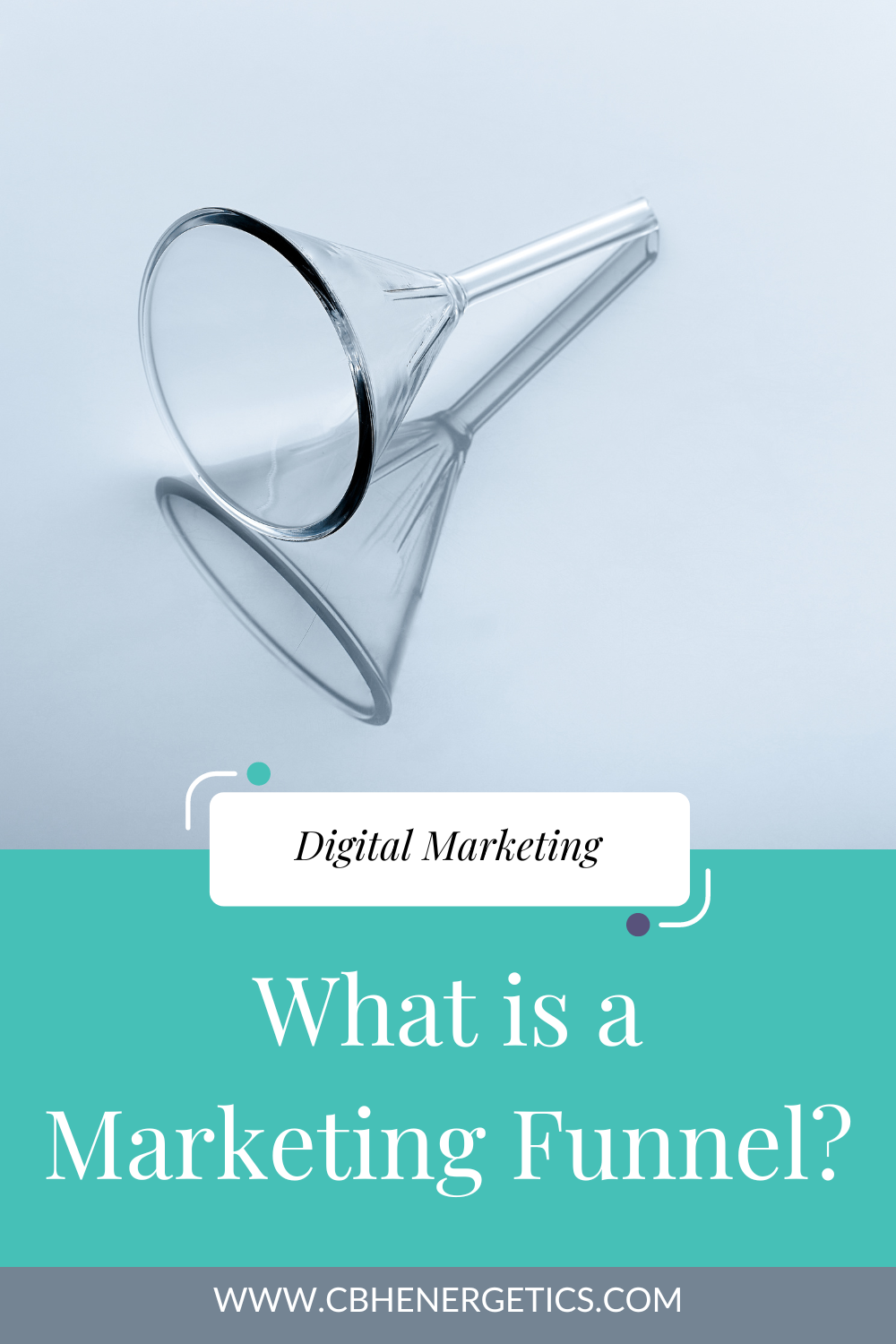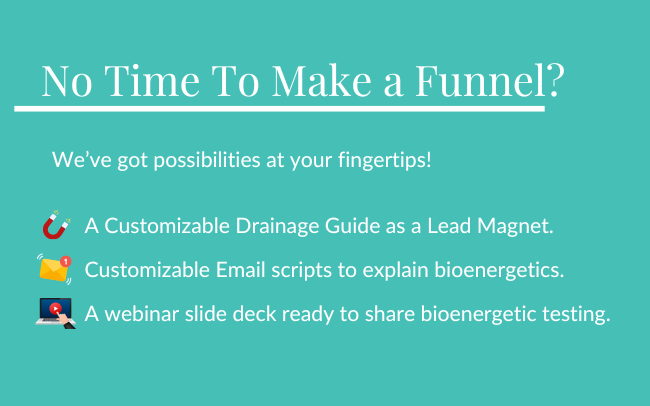Dec 18
/
Tanya Stricek
What is a Marketing Funnel and How To Build One

Understanding the Concept: What is a Marketing Funnel?
Do you ever wonder how businesses manage to convert a casual web visitor into a loyal customer? One of the secrets lies in a concept called a marketing funnel.
This concept is the backbone of any successful marketing strategy. To ensure your business thrives in this competitive market, understanding this concept is essential.
A marketing funnel is broad at the top and narrow at the bottom.
Just like a real funnel.
This concept is the backbone of any successful marketing strategy. To ensure your business thrives in this competitive market, understanding this concept is essential.
A marketing funnel is broad at the top and narrow at the bottom.
Just like a real funnel.

Our Bioenergetic Certification Course
gives you a SIMPLE MARKETING FUNNEL
that you can start today!
By thinking of your basic kitchen funnel, you can visually illustrate the journey of your potential customers, from the first point of contact with your brand and business, to the ultimate goal: sales conversion.
The concept of a marketing funnel is not new, but with the evolution of digital marketing, it has gained massive importance.
The concept of a marketing funnel is not new, but with the evolution of digital marketing, it has gained massive importance.
In this blog post, you will learn everything about marketing funnels: what they are, why they are essential and how to build one strategically.

What is a marketing funnel?
It's a systematic and visual way to take a person who just met you, through a journey that shows them what you are all about.
It helps them decide whether you are right for them, or not. This is a good thing.
We can't be all things to all people! Especially in marketing.
You can think of a funnel like a roadmap, where your client:
► Gains awareness of you. Maybe they found you on Instagram and started following you. Social media is part of your funnel. It usually is considered "top of funnel."
► Gains awareness of you. Maybe they found you on Instagram and started following you. Social media is part of your funnel. It usually is considered "top of funnel."
► From here, they develop an interest in you. This is where they might want to pick up your lead magnet, or opt in. A really good free item that gives your potential client a win, and shows them what it looks like to work with you.
► After this experience, your potential client may decide to buy from you! They feel aligned, and ready to purchase what you offer.
The marketing funnel is divided into several stages.
Each stage represents a different phase of the customer's journey, starting from awareness, interest, decision, to action. The stages may vary depending on the business model, but the concept remains the same.
Understanding a marketing funnel is not rocket science, but it does require a deep understanding of your customer behavior. It's about knowing what motivates your customers, what their needs are, and how your product or service can fulfill those needs.
The Importance of a Marketing Funnel in Business Strategy
You might be wondering, why is a marketing funnel so important?
First, it provides a clear structure for your marketing strategy. It ensures that your efforts are directed towards the right stage of the customer journey, making your marketing activities more efficient and effective.
First, it provides a clear structure for your marketing strategy. It ensures that your efforts are directed towards the right stage of the customer journey, making your marketing activities more efficient and effective.
Second, a marketing funnel helps you understand your customers better. It provides insights into their behavior, preferences, and pain points at each stage of the funnel. This information is crucial in crafting a personalized marketing message that resonates with your target audience.
Finally, a marketing funnel allows you to measure the effectiveness of your marketing activities. By analyzing the conversion rate at each stage of the funnel, you can identify the areas that need improvement and strategize accordingly.
Key Stages of a Marketing Funnel
A marketing funnel typically consists of four key stages: Awareness, Interest, Decision, and Action (AIDA).
STEP ONE:
The Awareness stage. Here, potential customers learn about your brand or product for the first time. This is where you attract the attention of your target audience through various marketing strategies.
STEP ONE:
The Awareness stage. Here, potential customers learn about your brand or product for the first time. This is where you attract the attention of your target audience through various marketing strategies.
STEP TWO:
The Interest stage. Here, your prospects start showing interest in your product or service. They might subscribe to your newsletter, follow you on social media, or visit your website to learn more about what you offer.
The Interest stage. Here, your prospects start showing interest in your product or service. They might subscribe to your newsletter, follow you on social media, or visit your website to learn more about what you offer.
STEP THREE:
The Decision stage. Your prospects are now considering whether to buy your product or not. This is the time to convince them with compelling content, product demos, customer testimonials, or special offers.
The Decision stage. Your prospects are now considering whether to buy your product or not. This is the time to convince them with compelling content, product demos, customer testimonials, or special offers.
STEP FOUR:
The Action stage. Your prospects become your customers. They make the decision to purchase your product or service. But the marketing funnel doesn't end here. You need to work on retaining these customers and turning them into loyal advocates for your brand.
The Action stage. Your prospects become your customers. They make the decision to purchase your product or service. But the marketing funnel doesn't end here. You need to work on retaining these customers and turning them into loyal advocates for your brand.
Step-by-step Guide: How to Strategically Build a Marketing Funnel
Building a marketing funnel is not a one-time task. It requires continuous effort, analysis, and optimization.
Here's a step-by-step guide to help you build a strategic marketing funnel:
Here's a step-by-step guide to help you build a strategic marketing funnel:
STEP ONE:
Define Your Target Audience. Understand who your ideal customers are, their needs, desires, and pain points. This will help you create a personalized marketing message that resonates with them.
Define Your Target Audience. Understand who your ideal customers are, their needs, desires, and pain points. This will help you create a personalized marketing message that resonates with them.
STEP TWO:
Create Awareness. Use various marketing strategies such as content marketing, SEO, social media, and PPC advertising to reach your target audience and make them aware of your brand.
Create Awareness. Use various marketing strategies such as content marketing, SEO, social media, and PPC advertising to reach your target audience and make them aware of your brand.
STEP THREE:
Generate Interest. Provide valuable and engaging content to your prospects to pique their interest. You can use blogs, ebooks, webinars, or social media posts for this purpose.
Generate Interest. Provide valuable and engaging content to your prospects to pique their interest. You can use blogs, ebooks, webinars, or social media posts for this purpose.
STEP FOUR:
Nurture Leads. Use email marketing, retargeting ads, or personalized content to nurture your leads and guide them through the decision-making process.
Nurture Leads. Use email marketing, retargeting ads, or personalized content to nurture your leads and guide them through the decision-making process.
STEP FIVE:
Drive Action. Use compelling CTAs, attractive offers, and seamless checkout process to encourage your leads to take action and make a purchase.
Drive Action. Use compelling CTAs, attractive offers, and seamless checkout process to encourage your leads to take action and make a purchase.
STEP SIX:
Retain Customers. Don't stop once the sale is made. Use strategies like customer support, loyalty programs, and regular communication to retain your customers and turn them into a thriving community!
Retain Customers. Don't stop once the sale is made. Use strategies like customer support, loyalty programs, and regular communication to retain your customers and turn them into a thriving community!
Top Tools for Building Effective Marketing Funnels
Building a marketing funnel requires the right set of tools. Here are some of the top tools that can help you create an effective marketing funnel:
Google Analytics: It's an essential tool for tracking your website traffic, user behavior, and conversion rate. It provides valuable insights that can help you optimize your marketing funnel.
An email service provider: It's a powerful email marketing tool that allows you to send personalized emails to your leads and nurture them through the funnel.
A CRM (Customer Relationship Management) provider.
It's an all-in-one marketing tool that offers CRM, email marketing, content management, and analytics. It's a great tool for managing your marketing funnel, as you grow a large client base.
Design Tools.
If you are handling your own images, having a design tool that allows you to create engaging visual content for your marketing funnel, such as infographics, social media images, and blog visuals is a must!
If you are handling your own images, having a design tool that allows you to create engaging visual content for your marketing funnel, such as infographics, social media images, and blog visuals is a must!
Landing Pages.
A landing page builder that allows you to create high-converting landing pages for your marketing funnel. You can create this in your email platform, or CRM.
A landing page builder that allows you to create high-converting landing pages for your marketing funnel. You can create this in your email platform, or CRM.
Tips for Optimizing Your Marketing Funnel for Better Results
Building a marketing funnel is just the first step. You need to continuously optimize it for better results. Here are some tips:
Analyze Your Funnel:
Regularly analyze your marketing funnel to identify the areas that need improvement. Look for any bottlenecks or leakages where your leads might be dropping off.
Regularly analyze your marketing funnel to identify the areas that need improvement. Look for any bottlenecks or leakages where your leads might be dropping off.
Test and Experiment:
Try different strategies, content types, and marketing channels to see what works best for your target audience. A/B testing can be a great way to find out what resonates with your audience.
Try different strategies, content types, and marketing channels to see what works best for your target audience. A/B testing can be a great way to find out what resonates with your audience.
Personalize Your Marketing:
Personalization can significantly improve your conversion rate. Use personalized emails, content, and offers to make your leads feel special and valued.
Personalization can significantly improve your conversion rate. Use personalized emails, content, and offers to make your leads feel special and valued.
Improve Your Landing Pages:
Your landing pages play a crucial role in your marketing funnel. Make sure they are optimized for conversion with a clear CTA, compelling copy, and seamless design.
Your landing pages play a crucial role in your marketing funnel. Make sure they are optimized for conversion with a clear CTA, compelling copy, and seamless design.
Nurture Your Leads:
Don't rush your leads through the funnel. Take the time to nurture them with valuable content and regular communication.
Don't rush your leads through the funnel. Take the time to nurture them with valuable content and regular communication.
Misconceptions and Myths About Marketing Funnels
Despite its significance, there are several misconceptions about marketing funnels.
Some believe that marketing funnels are outdated, while others think they are too complicated to implement.
Some believe that marketing funnels are outdated, while others think they are too complicated to implement.
First, marketing funnels are not outdated.
Yes, the customer journey has become more complex with the advent of digital marketing, but the concept of a marketing funnel is still relevant. It provides a structured approach to understanding and influencing the customer journey.
Yes, the customer journey has become more complex with the advent of digital marketing, but the concept of a marketing funnel is still relevant. It provides a structured approach to understanding and influencing the customer journey.
Second, marketing funnels are not too complicated.
Yes, they require planning and continuous optimization, but with the right tools and guidance, anyone can build an effective marketing funnel!
Yes, they require planning and continuous optimization, but with the right tools and guidance, anyone can build an effective marketing funnel!
Are You Ready For The Power of a Strategic Marketing Funnel?
Hopefully we have inspired you to create a marketing funnel that can transform your marketing strategy.
It provides a structured approach to understanding your customer journey, tailoring your marketing efforts, and driving conversions.
Remember, the success of your marketing funnel lies in the value you provide to your customers at each stage of their journey.
It provides a structured approach to understanding your customer journey, tailoring your marketing efforts, and driving conversions.
Remember, building a marketing funnel is not a one-time task.
It's a continuous process that requires regular analysis and optimization. But the effort is worth it, as a well-crafted marketing funnel can significantly boost your business growth.
It can also bring in those clients that are aligned with your energy!So? Is it time to harness the power of a strategic marketing funnel for your business?
Start by understanding your target audience.
WHAT DO THEY WANT AND NEED?
Understanding THIS will help you create a marketing funnel that speaks to their needs and interests.
Let’s say they struggle with digestion, and are looking for answers to help their gas, bloating and constipation.
Here are some suggestions for your lead magnet, to attract people into your funnel.
It can also bring in those clients that are aligned with your energy!So? Is it time to harness the power of a strategic marketing funnel for your business?
Start by understanding your target audience.
WHAT DO THEY WANT AND NEED?
Understanding THIS will help you create a marketing funnel that speaks to their needs and interests.
Let’s say they struggle with digestion, and are looking for answers to help their gas, bloating and constipation.
Here are some suggestions for your lead magnet, to attract people into your funnel.
- A PDF of the Top Ten Best Foods For Gut Health
- A How to Help Your Digestion Webinar
- A Digestion Quiz
- A Gut Health “Challenge”
Remember, the success of your marketing funnel lies in the value you provide to your customers at each stage of their journey.

DISCLAIMER: Balanced Health, LLC/CBH Energetics and any parent, subsidiary, affiliated or related entities and companies do not provide medical advice or services. The bioenergetic products and services offered by Balanced Health, LLC/CBH Energetics including, but not limited to, bioenergetic tests, bioenergetic scans, bioenergetic reports and related products and services (collectively the “Bioenergetic Products and Services”) are designed for educational and informational purposes only and are not intended to diagnose, treat, cure, or prevent any disease, condition, complaint, illness or medical condition and are not a substitute for professional services or medical advice. Seek the advice of a physician or other qualified healthcare professional with any questions you may have. Never disregard professional medical advice or delay seeking treatment. These statements have not been evaluated by the Food and Drug Administration (FDA) or any other government agencies or regulatory authorities. Balanced Health, LLC/CBH Energetics is not responsible for third-party interpretation, recommendation or advice or for any third-party interpreting or providing recommendations or advice related to Balanced Health, LLC/CBH Energetics or Balanced Health, LLC/CBH Energetics Bioenergetic Products and Services. Balanced Health, LLC/CBH Energetics does not recommend, endorse or make any representation about the efficacy, appropriateness or suitability of any specific tests, products, procedures, treatments, services, opinions, or health care providers.Copyright © 2024 Balanced Health, L.L.C. dba CBH Energetics
www.CBHenergetics.com
Phone number: 612-812-9121
www.CBHenergetics.com
Phone number: 612-812-9121
Copyright © 2026

